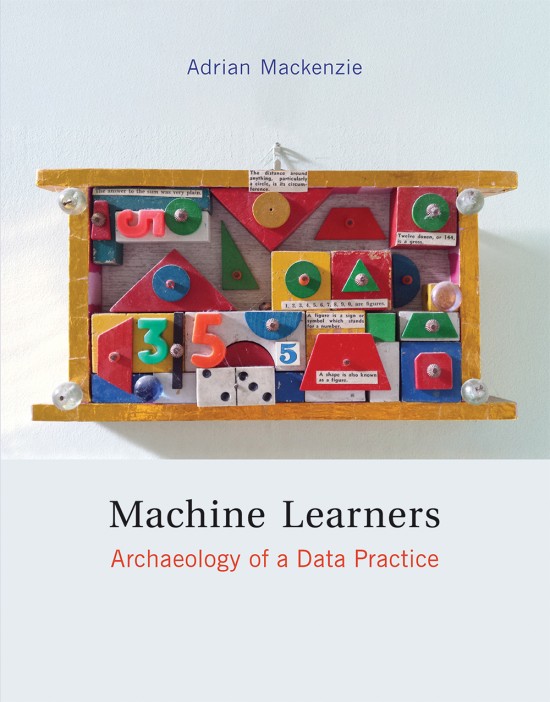Adrian Mackenzie: Machine Learners: Archaeology of a Data Practice (2017)
Filed under book | Tags: · abstraction, algorithm, archaeology, artificial intelligence, code, data, diagram, error, information science, information theory, knowledge, machine learning, mathematics, neural networks, programming, theory

“If machine learning transforms the nature of knowledge, does it also transform the practice of critical thought?
Machine learning—programming computers to learn from data—has spread across scientific disciplines, media, entertainment, and government. Medical research, autonomous vehicles, credit transaction processing, computer gaming, recommendation systems, finance, surveillance, and robotics use machine learning. Machine learning devices (sometimes understood as scientific models, sometimes as operational algorithms) anchor the field of data science. They have also become mundane mechanisms deeply embedded in a variety of systems and gadgets. In contexts from the everyday to the esoteric, machine learning is said to transform the nature of knowledge. In this book, Adrian Mackenzie investigates whether machine learning also transforms the practice of critical thinking.
Mackenzie focuses on machine learners—either humans and machines or human-machine relations—situated among settings, data, and devices. The settings range from fMRI to Facebook; the data anything from cat images to DNA sequences; the devices include neural networks, support vector machines, and decision trees. He examines specific learning algorithms—writing code and writing about code—and develops an archaeology of operations that, following Foucault, views machine learning as a form of knowledge production and a strategy of power. Exploring layers of abstraction, data infrastructures, coding practices, diagrams, mathematical formalisms, and the social organization of machine learning, Mackenzie traces the mostly invisible architecture of one of the central zones of contemporary technological cultures.
Mackenzie’s account of machine learning locates places in which a sense of agency can take root. His archaeology of the operational formation of machine learning does not unearth the footprint of a strategic monolith but reveals the local tributaries of force that feed into the generalization and plurality of the field.”
Publisher MIT Press, November 2017
ISBN 9780262036825, 0262036827
272 pages
via A.B.
Review: Graham White (Computational Culture, 2021)
PDF (removed on 2018-8-20 upon request from publisher)
Draft and code samples on GIT
D. Fox Harrell: Phantasmal Media: An Approach to Imagination, Computation, and Expression (2013)
Filed under book | Tags: · agency, artificial intelligence, cognition, computation, computing, epistemology, ethnicity, imagination, interface, meaning, media, metaphor, narrative, new media art, poetics, power, race, self, semiotics, subjectivity, technology, theory, video games

“An argument that great expressive power of computational media arises from the construction of phantasms—blends of cultural ideas and sensory imagination.
In Phantasmal Media, D. Fox Harrell considers the expressive power of computational media. He argues, forcefully and persuasively, that the great expressive potential of computational media comes from the ability to construct and reveal phantasms—blends of cultural ideas and sensory imagination. These ubiquitous and often-unseen phantasms—cognitive phenomena that include sense of self, metaphors, social categories, narrative, and poetic thinking—influence almost all our everyday experiences. Harrell offers an approach for understanding and designing computational systems that have the power to evoke these phantasms, paying special attention to the exposure of oppressive phantasms and the creation of empowering ones. He argues for the importance of cultural content, diverse worldviews, and social values in computing. The expressive power of phantasms is not purely aesthetic, he contends; phantasmal media can express and construct the types of meaning central to the human condition.
Harrell discusses, among other topics, the phantasm as an orienting perspective for developers; expressive epistemologies, or data structures based on subjective human worldviews; morphic semiotics (building on the computer scientist Joseph Goguen’s theory of algebraic semiotics); cultural phantasms that influence consensus and reveal other perspectives; computing systems based on cultural models; interaction and expression; and the ways that real-world information is mapped onto, and instantiated by, computational data structures.
The concept of phantasmal media, Harrell argues, offers new possibilities for using the computer to understand and improve the human condition through the human capacity to imagine.”
Publisher MIT Press, 2013
ISBN 9780262019330, 0262019337
xix+420 pages
Reviews: John Harwood (Artforum, 2014), Brian Reffin Smith (Leonardo, 2015).
Comment (0)Ellen Ullman: Life in Code: A Personal History of Technology (2017)
Filed under book | Tags: · artificial intelligence, code, computing, history of technology, internet, memoir, programming, technology

“The last twenty years have brought us the rise of the internet, the development of artificial intelligence, the ubiquity of once unimaginably powerful computers, and the thorough transformation of our economy and society. Through it all, Ellen Ullman lived and worked inside that rising culture of technology, and in Life in Code she tells the continuing story of the changes it wrought with a unique, expert perspective.
When Ellen Ullman moved to San Francisco in the early 1970s and went on to become a computer programmer, she was joining a small, idealistic, and almost exclusively male cadre that aspired to genuinely change the world. In 1997 Ullman wrote Close to the Machine, the now classic and still definitive account of life as a coder at the birth of what would be a sweeping technological, cultural, and financial revolution.
Twenty years later, the story Ullman recounts is neither one of unbridled triumph nor a nostalgic denial of progress. It is necessarily the story of digital technology’s loss of innocence as it entered the cultural mainstream, and it is a personal reckoning with all that has changed, and so much that hasn’t.”
Publisher Farrar, Straus & Giroux, 2017
ISBN 9780374534516, 0374534519
viii+306 pages
via andre
Video talk (54 min, 2017)
Reviews: J.D. Biersdorfer (New York Times, 2017), Jessica Bennett (Elle, 2017).
Comment (0)
